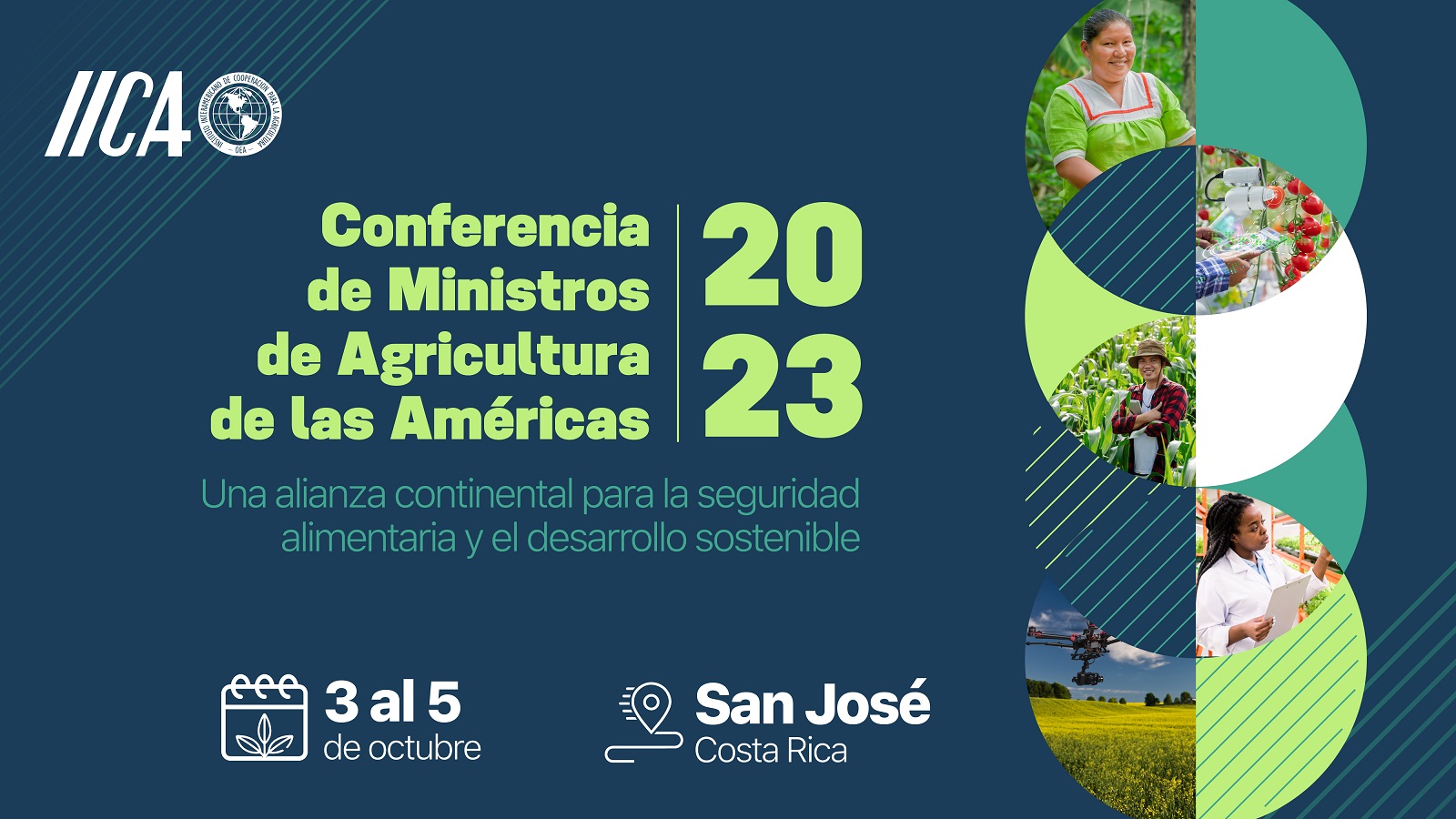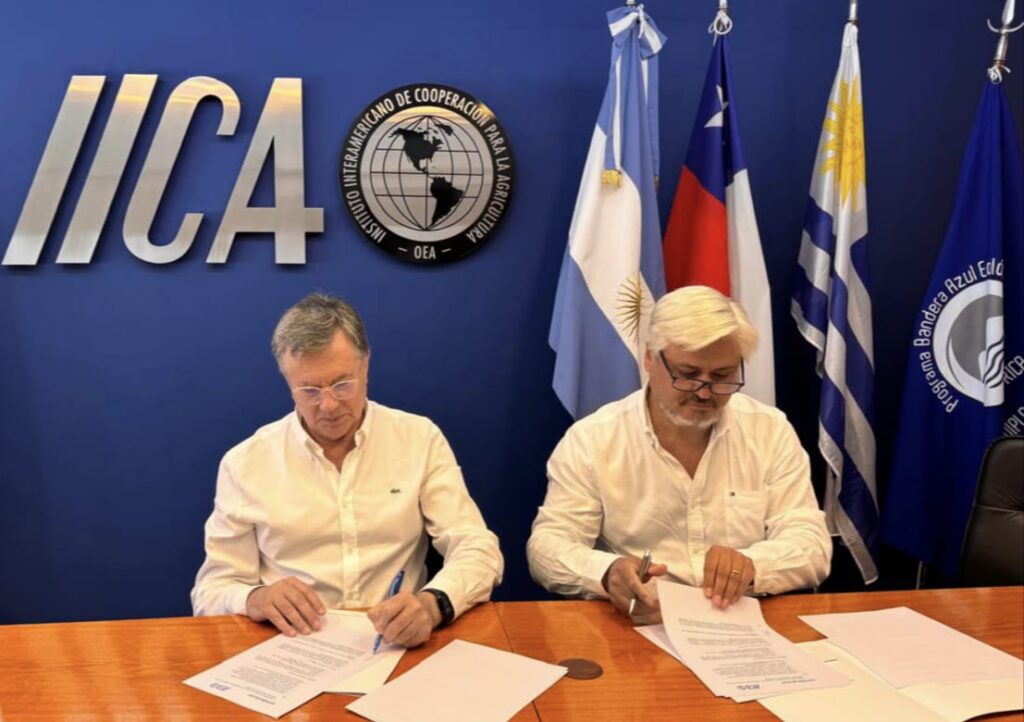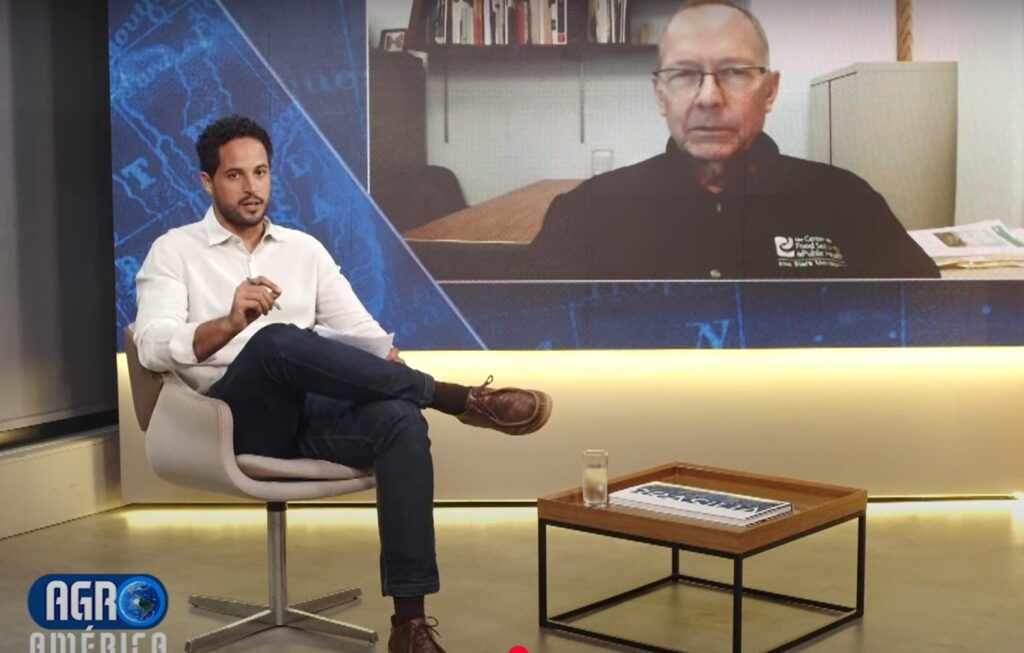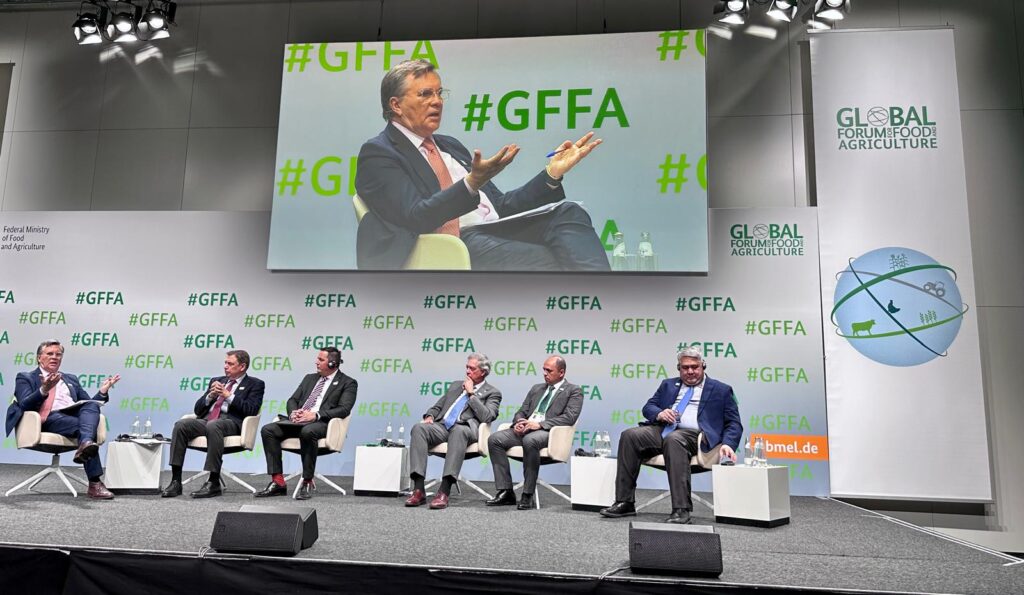Los ministros, que sesionarán bajo el lema “Una alianza continental para la seguridad alimentaria y el desarrollo sostenible”, coincidieron en que resulta crucial promover alianzas estratégicas que incluyan a los sectores público y privado e impulsar el rol de la cooperación técnica para construir un agro más productivo y resiliente.

San José, 2 de octubre de 2023 (IICA) – Ministros de Agricultura de las Américas afirmaron que la acción colectiva es imprescindible para garantizar la seguridad alimentaria y fortalecer el rol de la actividad agropecuaria en el desarrollo de los países de la región, en un contexto de cambio climático y crisis económica.
En ese sentido, anticiparon que la Conferencia de Ministros de Agricultura de las Américas, que sesionará esta semana en San José, Costa Rica, será una gran oportunidad para estimular acciones conjuntas que potencien la sostenibilidad e intercambiar conocimientos y experiencias positivas.
La sede central del Instituto Interamericano de Cooperación para la Agricultura (IICA) será escenario de la Conferencia, que reunirá a los ministros del hemisferio entre el 3 y el 5 de octubre. En los debates participarán también otras altas autoridades nacionales y de organismos internacionales, académicos con reconocimiento mundial y representantes del sector productivo e industrial.
Los presidentes de Guyana, Mohamed Irfaan Ali; y de Panamá, Laurentino Cortizo, serán oradores en la ceremonia de inauguración.
En la apertura también se anuncian mensajes de la Ministra de Medio Ambiente de los Emiratos Árabes Unidos, país que este año será sede de la COP 28, Marian Almheiri; el CEO de la fundación Premio Mundial de la Alimentación (WFP), Terry Branstad; el ministro de Agricultura y Ganadería de Costa Rica, Víctor Carvajal; y el anfitrión de la reunión, el Director General del IICA, Manuel Otero.
Los ministros, que sesionarán bajo el lema “Una alianza continental para la seguridad alimentaria y el desarrollo sostenible”, coincidieron en que resulta crucial promover alianzas estratégicas que incluyan a los sectores público y privado e impulsar el rol de la cooperación técnica para construir un agro más productivo y resiliente.
Fernando Mattos, Ministro de Ganadería, Agricultura y Pesca de Uruguay, y también presidente del Consejo Agropecuario del Sur (CAS), hizo hincapié en la importancia de la acción colectiva de los países y en las soluciones que aporta la ciencia y la tecnología para hacer frente a la crisis hídrica.
“Hoy nos vemos enfrentados a desafíos climáticos crecientes que comprometen el abastecimiento del agua al planeta. Los sistemas productivos deberán generar sistemas de adaptación y de resiliencia mucho más fuertes y potentes”, indicó Mattos.
“Es esencial que no enfrentemos estos desafíos solos, sino que trabajemos juntos para encontrar soluciones efectivas y aprender de los países que desarrollan prácticas exitosas. Debemos colaborar estrechamente con las diversas partes interesadas para lograr un impacto significativo en el sector agroalimentario”, señaló por su parte la Secretaria de Agricultura y Ganadería de Honduras, Laura Suazo.
El Ministro de Agricultura, Suelos y Pesca de Trinidad y Tobago, Avinash Singh, afirmó que las capacidades y conocimientos desarrollados en los países del hemisferio son más útiles juntos que separados para lidiar contra los desafíos comunes en materia de seguridad alimentaria. “Se requieren alianzas –sostuvo- a niveles nacional, regional y global. Reconocemos en el IICA a un actor clave en la promoción de la acción colectiva, que a su vez es central para el desarrollo económico de una región de gran riqueza en recursos naturales y biodiversidad”.
Abordar desafíos comunes
Algunos de los temas de agenda de la Conferencia de Ministros de Agricultura 2023 serán inclusión social y agricultura familiar, mitigación y adaptación al cambio climático, crisis hídrica, incorporación de tecnología digital, financiación de la ciencia e investigación aplicada al agro y comercio internacional.
En el marco de la Conferencia sesionará la Junta Interamericana de Agricultura (JIA), órgano superior de gobierno del IICA, integrado por los 34 Estados Miembros del organismo del Sistema Interamericano especializado en desarrollo agrícola y rural.
El Ministro de Agricultura y Ganadería costarricense, Víctor Carvajal, hizo hincapié en el valor de la Conferencia como espacio de intercambio de conocimientos y experiencias para impulsar la sostenibilidad de la agricultura del hemisferio ante los grandes retos ambientales, climáticos y de seguridad alimentaria globales.
“La reunión permitirá que proyectos como la NAMA de caña de azúcar costarricense sean expuestos como ejemplos positivos en la innovación sostenible del sector agrícola”, afirmó. Esta iniciativa, pionera en el mundo, tiene como objetivo ir hacia la carbono neutralidad y ser carbono positivos en el mediano plazo.
Por su lado, Zulfikar Mustapha, ministro de Guyana, puso en el primer plano el llamado del IICA para fortalecer los alcances de una alianza continental en pro de la seguridad alimentaria y la sostenibilidad ambiental.
“Démosle a esta alianza –afirmó- una sola voz como región y una dimensión estratégica, creando redes y plataformas que en la práctica fortalezcan nuestras instituciones”.
También el Ministro de Agricultura, Ganadería y Alimentación de Guatemala, Édgar De León, se mostró convencido de que la alianza continental propuesta por el IICA potenciará la sostenibilidad ambiental y la seguridad alimentaria en el hemisferio.
En ese sentido, llamó a abordar la alianza “desde el punto de vista político, actuando en forma unificada como región y desde el punto de vista estratégico, creando redes consistentes de trabajo para fortalecernos y brindar apoyo a sectores que tengan la misión de combatir la inseguridad alimentaria”.
El Ministro de Agricultura y Ganadería de El Salvador, y presidente pro tempore del Consejo Agropecuario Centroamericano (CAC), Óscar Enrique Guardado Calderón, hizo referencia a la crisis hídrica que vive la región. Por ese motivo, en la conferencia se avanzará sobre la implementación de la Iniciativa Hemisférica Agua y Agricultura del IICA –presentada en julio pasado-, que propicia una contribución del agro ante este grave escenario.
“Es imperativo que incluyamos en la agenda agrícola regional la gestión de recursos hídricos y la formulación de políticas innovadoras, que faciliten la adopción de tecnologías para una gestión integral del agua para la agricultura y la población en general”, dijo.
El Director General del IICA, Manuel Otero, consideró que ningún país puede enfrentar la crisis multidimensional que vive el planeta de manera aislada, y la cooperación técnica es una herramienta fundamental.
“Los desafíos son compartidos y debemos afrontarlos a nivel supranacional, trazando reformas en la cooperación técnica. La presencia de nuestros ministros y ministras de agricultura es crucial para alcanzar estos objetivos”, señaló.
Más información:
Gerencia de Comunicación Institucional
comunicacion.institucional@iica.int










